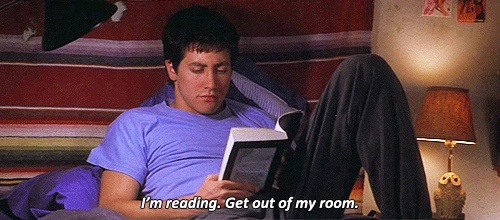6 Habits To Help You Fall Asleep Naturally And Have Great Quality Slumber
Have you ever had trouble shutting off your brain at bedtime? Your thoughts just keep going around like a merry-go-round in your head, and you’re so tired you feel like you have no choice but to pop some melatonin. You’re not the only one!

Most of our modern world has gone digital, and technology can be a great tool, but it has its downsides as well, especially as far as our health goes. It doesn’t help our circadian rhythm that the majority of our daily activities now include an electronic screen of some sort: computer, work phone, iPad/tablet, Kindle (because who reads real books anymore?), and even checkout registers have screens to process your payment (tap goes your Apple Pay). It's in the gym as well. A lot of the workout equipment, like the treadmill, stationary bike, and elliptical, all have screens. You can’t even go out to dinner without your meal often being interrupted by the TV in the corner showing the game. Plus, let’s face it, most adults have their smartphones with them most of the waking day, if not all of it (even when sleeping, it’s right next to your bed).
Our brain is almost constantly under artificial stimulation from electronic screens and their blue light. Besides presenting the very real exposure to EMF rays and inflammatory radiation (that conversation is for another day), these screens trigger your brain into a repeating cycle of alertness because the blue light tricks your eyes into thinking it’s daytime, regardless of if it’s pitch-black outside or even dim in your house. So, here is a simple yet practical list of tips for your bedtime routine to naturally calm yourself and induce deep slumber mode.
Limit Blue Light
Turn your phone on night mode in the mid to late afternoon and keep the screen brightness turned down to a minimum for the rest of the day. After it gets dark outside, keep your brightness down to a very low setting, if not the lowest. Use blue light glasses during the day, especially if your work is mostly on a computer, and even more so if you need to use a screen past sunset. This is a necessary investment for your eye health and sleep quality! Really try to turn off your phone and stop using your computer before you go to bed, ideally two hours before but for at least one hour.
Screen budgeting also includes TV time. Watching movies is fun but not very conducive to restful sleep, so reserve TV time for the weekend (and wear your blue light glasses with your show) and try to start early so you can turn the TV off before too late. If you really need to use your phone briefly, put on your blue light glasses and tilt the screen away from being right in front of your face, so it shines elsewhere and not directly on your eyes.

Read a Book
One with pages and a cover, not on a screen! This might seem strange and old-fashioned, but reading improves sleep quality because it exercises your eye muscles, makes your eyes tired, and relaxes your brain. Using a hardcopy book eliminates blue light interference with your natural melatonin production. Plus, cuddling up with a book is a coziness that never goes completely out of style! Sure, e-books are convenient, and the internet can serve up any title under the browser, but maybe treat yourself and your sleep schedule to buying a book you’ve been recommended and work through it leisurely, and you can save the Kindle for the daytime. If you only have time for reading in the evening and want to read something on your Kindle, then try to read earlier than later and remember to wear your blue light glasses.
Extra tip: Sometimes reading in bed can get your body all ready for sleep, so avoid using it as a recliner couch during the day. In general, try to save your bed as your place for bedtime (or special time with your hubby (*wink-wink*)).

Sleepy Tea
Drink a cup of chamomile tea in your favorite mug or teacup, maybe while you read your book – this ritual alone can help your brain register bedtime! Chamomile is a mild sedative and helps to induce drowsiness. Warm lemon water can even serve for a bedtime mocktail; warm lemon water is soothing and anti-inflammatory. Mint, ashwagandha, or ginger teas are also helpful for bedtime prep. Although they do not induce sleepiness, these teas are anti-inflammatory and help relax the nerves and calm your brain so you can start slowing down your thoughts for slumber. Make sure that your tea is herbal with no caffeine – all caffeine drinking should stop six to eight hours before bed (yes, skip that afternoon latte and swap for spa water).

Dim the Lights
Don’t brighten your fluorescent lights when the sky is dimming. Bright lights and blue lights from digital screens will interrupt your body’s production of natural melatonin. Follow the natural sunlight schedule and let the golden glow of sunset remind your eyes to start winding down. Except, obviously, when you’re reading and you need clear light for vision, otherwise keep the lights dim to help the natural melatonin kick in. Maybe use a lamp instead of the main overhead lights, or at least keep them on a low setting. Have fun making a cozy ambiance, and light some candles!

Slow Stretching
We know that stretching is good for us. We’ve been told time and again how beneficial it is for our health, and yet how often do we make it a priority? Stretching helps the nerves to relax, improves blood flow and general circulation, and reduces inflammation; all this assists in muscle recovery and sleep quality. Stretching slowly before bed can relax your body, help you fall asleep quicker and easier, and contribute to a more effective snooze. Set your timer, even just start for three or five minutes, and let yourself focus on the moment and allow yourself to relax along with your muscles.
Meditation
Studies show that meditation helps reduce cortisol, which is the stress hormone, and increases natural melatonin production. Meditation can also help with depression, chronic stress, anxiety, and other mental health difficulties that may result in insomnia. Meditation can be an effective resource to calm the nerves and distract the mind from the burden of stressful thoughts, helping you to fall asleep easier and sleep soundly. Try to make a calm environment for yourself, externally as well as internally, so that your mind and body can enter into a meditative disposition. Play some soothing water sounds or a quiet sleep guided meditation to help your brain slow down and fall asleep.

Closing Thoughts
Use these tips as tools but don’t obsess. If you stress out about screens and natural melatonin interruption (been there and done that), then you’re being counter-productive, and you’ll have to work twice as hard to calm yourself down for sleep. Don’t let your screens own you. You need to be in charge and allow yourself take a break from your laptop, phone, TV, whatever it may be, and let your brain relax. If you give yourself time to unplug in the evening, your mind will also know when it's time to go to sleep.
Love Evie? Sign up for our newsletter and get curated content weekly!